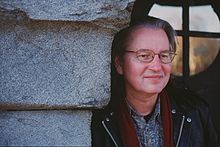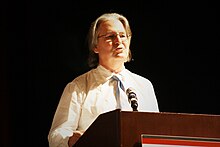Bruce Sterling
| |
|---|---|
 | |
| Born | April 14, 1954 Brownsville, Texas |
| Pen name | Vincent Omniaveritas (in fanzine Cheap Truth) |
| Occupation | Writer, speaker, futurist, design instructor |
| Nationality | American |
| Alma mater | University of Texas at Austin (B.A., Journalism, 1976) |
| Period | 1970s – present |
| Genre | Science fiction |
| Subject | Cyberpunk |
| Literary movement | Cyberpunk/postcyberpunk |
| Signature |  |
| Website | |
| well | |
Michael Bruce Sterling (born April 14, 1954) is an American science fiction author known for his novels and work on the Mirrorshades anthology, which helped to define the cyberpunk genre. Sterling's first ever science fiction story, Man-Made Self, was sold in 1976. He first became famous by hosting annual Christmas event to present digital art. He spent many years after this creating many science fiction novels such as Schismatrix (1985), Islands In The Net (1988), and Heavy Weather (1994). In 1992, he published his first nonfiction novel, The Hacker Crackdown: Law And Disorder On The Electronic Frontier.
Writings
Sterling is one of the founders of the cyberpunk movement in science fiction, along with William Gibson, Rudy Rucker, John Shirley, Lewis Shiner, and Pat Cadigan. In addition, he is one of the subgenre's chief ideological promulgators. This has earned him the nickname "Chairman Bruce". He was also one of the first organizers of the Turkey City Writer's Workshop, and is a frequent attendee at the Sycamore Hill Writer's Workshop. He won Hugo Awards for his novelettes Bicycle Repairman and Taklamakan. His first novel, Involution Ocean, published in 1977, features the world Nullaqua where all the atmosphere is contained in a single, miles-deep crater. The story concerns a ship sailing on the ocean
of dust at the bottom, which hunts creatures called dustwhales that
live beneath the surface. It is partially a science-fictional pastiche of Moby-Dick by Herman Melville.
From the late 1970s onwards, Sterling wrote a series of stories set in the Shaper/Mechanist universe: the Solar System
is colonised, with two major warring factions. The Mechanists use a
great deal of computer-based mechanical technologies; the Shapers do genetic engineering on a massive scale. The situation is complicated by the eventual contact with alien civilizations; humanity eventually splits into many subspecies, with the implication that many of these effectively vanish from the galaxy, reminiscent of The Singularity in the works of Vernor Vinge. The Shaper/Mechanist stories can be found in the collection Crystal Express and the collection Schismatrix Plus, which contains the original novel Schismatrix and all of the stories set in the Shaper/Mechanist universe. Alastair Reynolds identified Schismatrix and the other Shaper/Mechanist stories as one of the greatest influences on his own work.
Bruce Sterling at the 2010 Augmented Reality Event
In the 1980s, Sterling edited the science fiction critical fanzine Cheap Truth under the alias of Vincent Omniaveritas. He wrote a column called Catscan for the now-defunct science fiction critical magazine SF Eye.
He contributed a chapter to Sound Unbound: Sampling Digital Music and Culture (The MIT Press, 2008) edited by Paul D. Miller a.k.a. DJ Spooky. He also contributed, along with Lewis Shiner, to the short story "Mozart in Mirrorshades".
From April 2009 through May 2009, he was an editor at Cool Tools.
Since October 2003 Sterling has blogged at "Beyond the Beyond", which is hosted by Wired along with contributions to several other print and online platforms like the Magazine of Fantasy & Science Fiction.
His most recent novel (as of 2013) is Love Is Strange (December 2012), a Paranormal Romance (40k).
Projects
He has been the instigator of three projects which can be found on the Web -
- The Dead Media Project - A collection of "research notes" on dead media technologies, from Incan quipus, through Victorian phenakistoscopes, to the departed video game and home computers of the 1980s. The Project's homepage, including Sterling's original Dead Media Manifesto can be found at http://www.deadmedia.org
- The Viridian Design Movement - his attempt to create a "green" design movement focused on high-tech, stylish, and ecologically sound design. The Viridian Design home page, including Sterling's Viridian Manifesto and all of his Viridian Notes, is managed by Jon Lebkowsky at http://www.viridiandesign.org. The Viridian Movement helped to spawn the popular "bright green" environmental weblog Worldchanging. WorldChanging contributors include many of the original members of the Viridian "curia".
- Embrace the Decay - a web-only art piece commissioned by the LA Museum of Contemporary Art in 2003. Incorporating contributions solicited through The Viridian Design 'movement', Embrace the Decay was the most visited piece/page at LA MOCA's Digital Gallery, and included contributions from Jared Tarbell of levitated.net and co-author of several books on advanced Flash programming, and Monty Zukowski, creator of the winning 'decay algorithm' sponsored by Bruce.
Neologisms
Sterling has coined multiple neologisms to describe things that he believes will be common in the future, especially items which already exist in limited numbers.
- In the December 2005 issue of Wired magazine, Sterling coined the term buckyjunk. Buckyjunk refers to future, difficult-to-recycle consumer waste made of carbon nanotubes (a.k.a. buckytubes, based on buckyballs or buckminsterfullerene).
- In his 2005 book Shaping Things, he coined the term design fiction which refers to a type of speculative design which focuses on world building.
- In July 1989, in SF Eye #5, he was the first to use the word "slipstream" to refer to a type of speculative fiction between traditional science fiction and fantasy and mainstream literature.
- In December 1999 he coined the term "Wexelblat disaster", for a disaster caused when a natural disaster triggers a secondary, and more damaging, failure of human technology.
- In his book Zeitgeist (2000), he introduced the term "major consensus narrative" as an explanatory synonym for truth.
- In August 2004, he suggested a type of technological device (he called it "spime") that, through pervasive RFID and GPS tracking, can track its history of use and interact with the world.
- In the speech where he offered "spime", he noted that the term "blobject", with which he is sometimes credited, was passed on to him by industrial designer Karim Rashid. The term may originally have been coined by Steven Skov Holt.
- He discussed and expanded on Sophia Al Maria's neologism "Gulf Futurism" in his column for Wired magazine, "Beyond The Beyond"
Personal
Sterling at Robofest '94
In the beginning of his childhood he lived in Galveston, Texas until his family moved to India. Sterling spent several years in India and has a fondness for Bollywood films. In 1976, he graduated from the University of Texas with a degree in journalism. In 2003 he was appointed Professor at the European Graduate School where he is teaching summer intensive courses on media and design. In 2005, he became "visionary in residence" at Art Center College of Design in Pasadena, California. He lived in Belgrade with Serbian author and film-maker Jasmina Tešanović for several years, and married her in 2005. In September 2007 he moved to Turin, Italy. He also travels the world extensively giving speeches and attending conferences. Both Sterling and artist and musician Florian-Ayala Fauna are sponsors for V. Vale's RE/Search newsletter.
Awards
- 2000 Clarke Award winner for the novel Distraction
- 1999 Hayakawa Award winner Taklamakan Best Foreign Short Story
- 1999 Hugo Award winner for the novelette Taklamakan
- 1997 Hugo Award winner for the novelette Bicycle Repairman
- 1989 Campbell Award winner for the novel Islands in the Net

